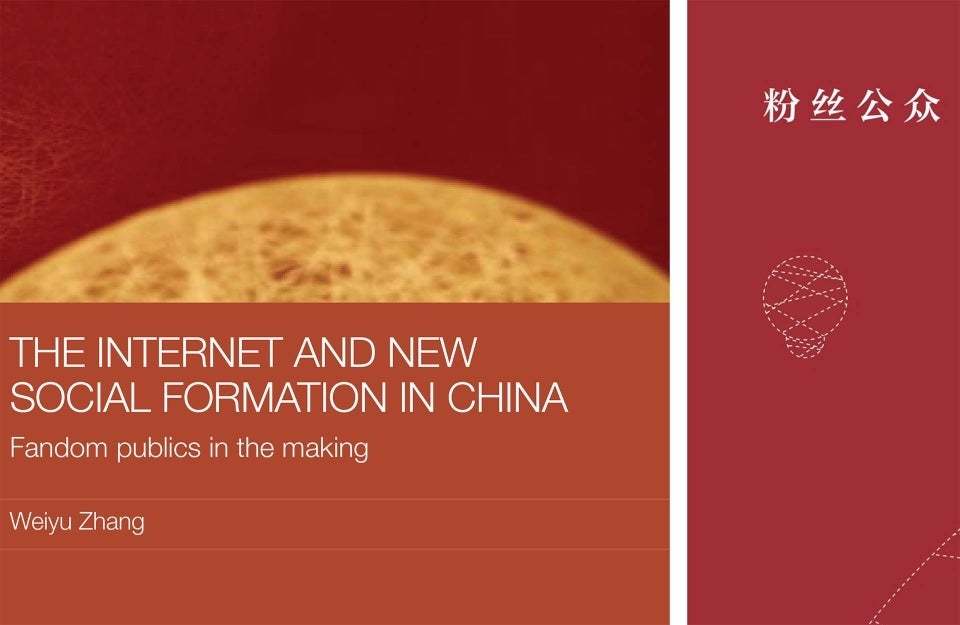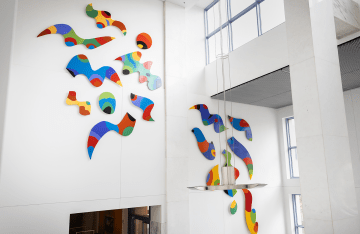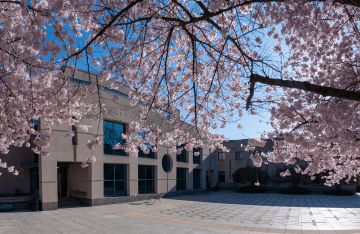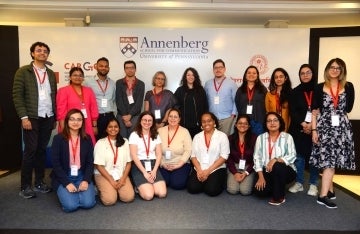Annenberg Student and Alumna Collaborate To Crowdsource Book Translation
Weiyu Zhang (Ph.D '08) and doctoral student Kecheng Fang collaborated on the Chinese translation of The Internet and New Social Formation in China: Fandom Publics in the Making.

Annenberg alumna Weiyu Zhang (Ph.D. ’08) first met Annenberg doctoral student Kecheng Fang last summer at a conference at the Penn Wharton China Center in Beijing.
At first, their connection was an Annenberg one. Zhang had no idea that Fang was the founder of CNPolitics.org, an independent website that transforms often complex academic studies of Chinese politics and culture into easy-to-understand stories for its more than 200,000 readers. An associate professor of communication and new media at the National University of Singapore, Zhang had been a follower of the site since 2013, when she gave a CNPolitics contributor permission to translate an article she’d co-authored.
Once the two started talking, they quickly realized the connection — and that conversation sparked an idea for a unique collaboration.
Zhang’s new book, The Internet and New Social Formation in China: Fandom Publics in the Making (released by Routledge in April), was published only in English and sells for $155. That may be standard for an academic text, particularly one by a first-time author, but it’s too pricey for the average person interested in such issues.
So she and Fang came up with an innovative way to create and publish a Chinese language version: They used crowdsourcing on CNPolitics to identify a team of volunteer translators. The resulting e-book in Chinese is now available for free download here from the CNPolitics website.
“I have never seen the purpose of publishing this book, regardless of English or Chinese versions, as making money,” says Zhang. “As a scholar, I have long been frustrated by the fact that my academic writing is read only by a few academic readers.”
Fang says that this project was right in line with his organization’s mission, which is to introduce more educational material to the everyday Chinese citizen.
“Researchers spend a long time researching these topics but their work is rarely read by ordinary people. So this is really part of the open scholarship movement,” says Fang, who was previously a journalist at one of China’s most influential newspapers, Southern Weekly. He also notes that researchers are largely funded by taxpayers, but the products of their research are often very expensive and hard for ordinary tax payers to access.
The traditional approach to translating a text like Zhang’s is to assign it to one or two professionals. That can be an expensive, lengthy process: According to estimates Zhang received from translation services, her 144-page book would have taken at least three months to translate and cost a minimum of 8,500 Singapore dollars (or about $5,800 U.S.).
Instead, Zhang and Fang employed an idea detailed in the book itself: crowdsourced translation.
Fang put out a call for translators on the CNPolitics website and social media platforms. He received more than 100 applications from which a 10-person squad was chosen. Each translator was assigned one chapter of the book, and a first draft was ready within six weeks.
Fang’s CNPolitics staff, all of whom are volunteers, then did the editing, proofreading, and design resulting in the high-resolution PDF now available for download.
After Zhang’s university gave her a grant to promote the book, she sent Fang $5,800 that was split mainly among the translators and designers; the rest was used to cover website expenses.
“I did feel that if I had the resources, why not compensate them for the time and effort they put in this?” says Zhang. Start to finish, the project took about six months to complete.
Though Zhang says some might question the book’s quality due to the crowdsourced translators, she notes that most of the translators are graduate students studying at European, American, or Asian universities with past translation experience. Some even spotted mistakes and made suggestions for improvement.
“The application of crowdsourcing to translate an academic text is a creative way to give more people access to scholarship,” says Dean Michael X. Delli Carpini. “And the fact that it resulted from a connection between an alumna and a current student is a testament to the type of innovative, collaborative thinking and networked community we encourage at the Annenberg School.”
To Zhang, this new publishing model may solve some of the longstanding difficulties that scholars have had in circulating their work. “I wanted to try this self-publication mode to see whether it could balance the challenges of accessibility and credibility,” she says.
As for Fang, he hopes this is the first in a long line of similar joint ventures. “One big problem in academia is that things come out slowly,” he says. “This way, we can get information out faster, free, and to a wider audience.”



